人教版(2019)必修 第三册Unit 1 Festivals and Celebrations课外拓展中华传统节日七夕节课件(共22张PPT)
文档属性
| 名称 | 人教版(2019)必修 第三册Unit 1 Festivals and Celebrations课外拓展中华传统节日七夕节课件(共22张PPT) |  | |
| 格式 | zip | ||
| 文件大小 | 8.3MB | ||
| 资源类型 | 教案 | ||
| 版本资源 | 人教版(2019) | ||
| 科目 | 英语 | ||
| 更新时间 | 2023-01-16 15:50:36 | ||
图片预览


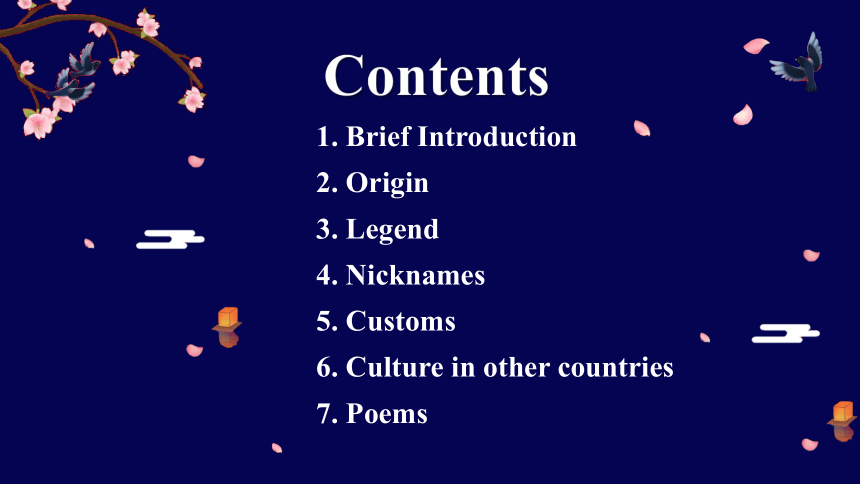
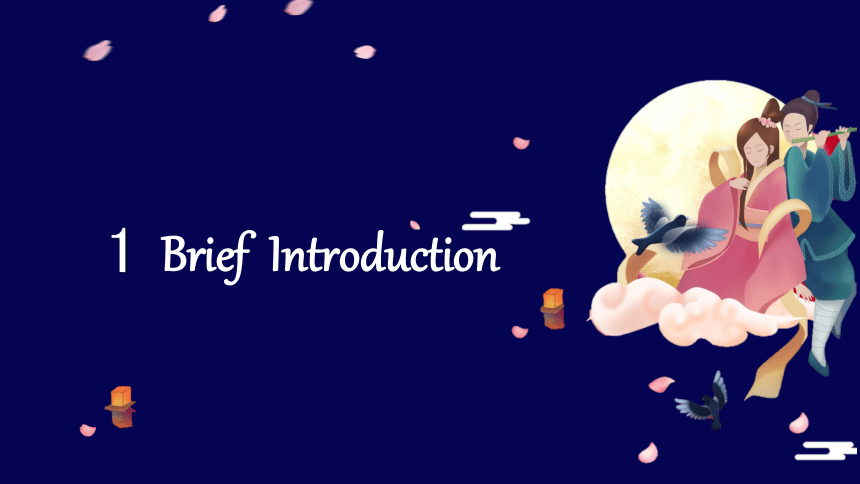
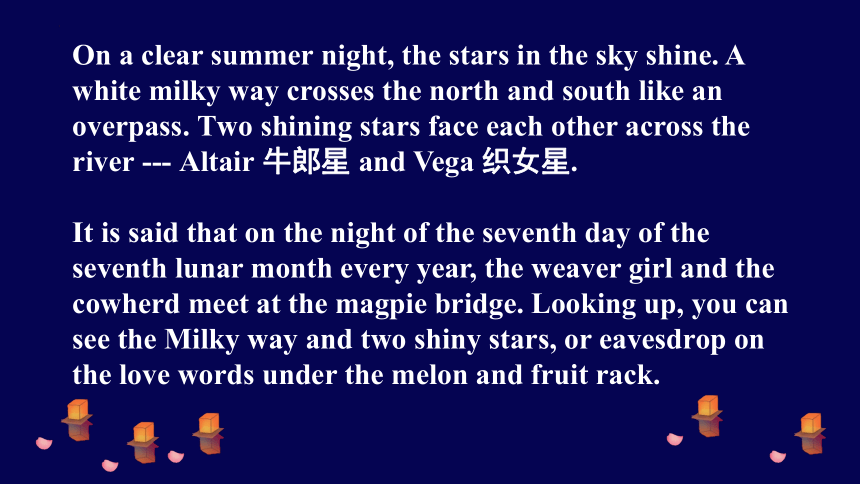
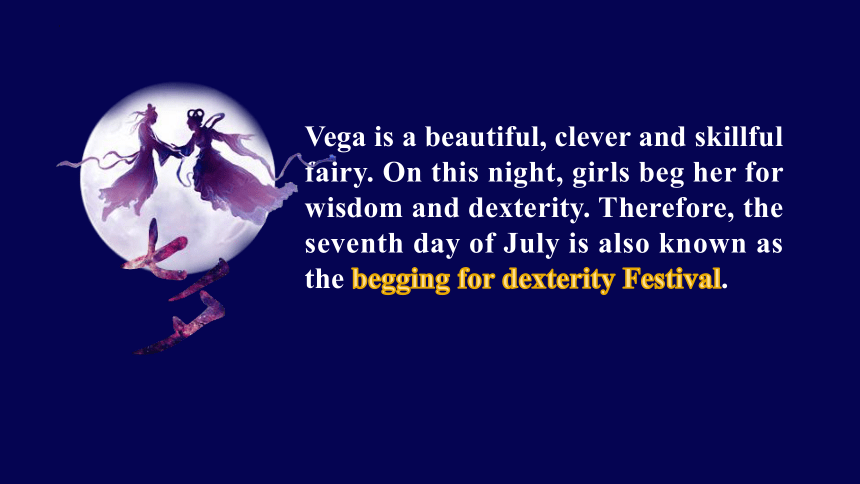
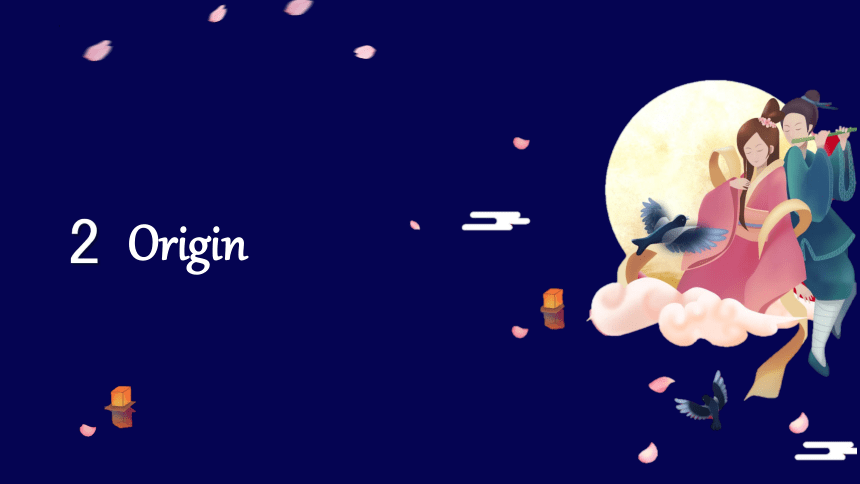
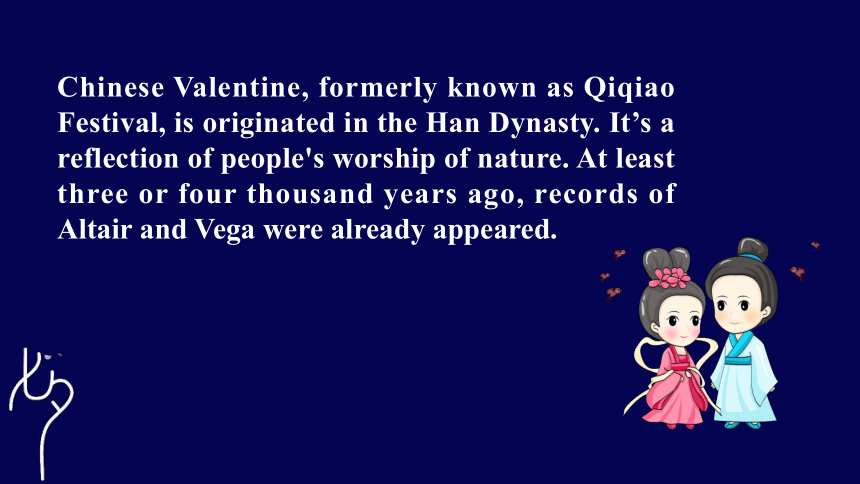
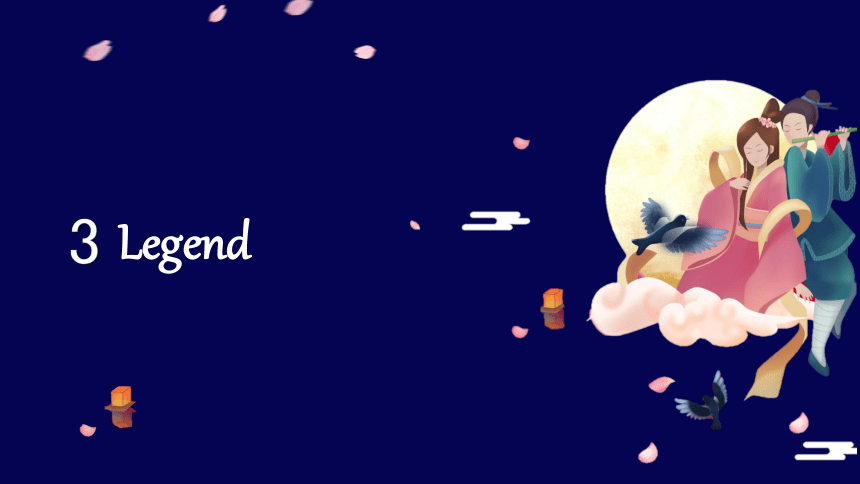
文档简介
(共22张PPT)
Hey! We are university students from New Zealand. And now, we are learning English Literature by reading Remeo and Juliet. Do you have some love stories in your culture
Contents
1. Brief Introduction
2. Origin
3. Legend
4. Nicknames
5. Customs
6. Culture in other countries
7. Poems
Brief Introduction
1
On a clear summer night, the stars in the sky shine. A white milky way crosses the north and south like an overpass. Two shining stars face each other across the river --- Altair 牛郎星 and Vega 织女星.
It is said that on the night of the seventh day of the seventh lunar month every year, the weaver girl and the cowherd meet at the magpie bridge. Looking up, you can see the Milky way and two shiny stars, or eavesdrop on the love words under the melon and fruit rack.
Vega is a beautiful, clever and skillful fairy. On this night, girls beg her for wisdom and dexterity. Therefore, the seventh day of July is also known as the begging for dexterity Festival.
Origin
2
Chinese Valentine, formerly known as Qiqiao Festival, is originated in the Han Dynasty. It’s a reflection of people's worship of nature. At least three or four thousand years ago, records of Altair and Vega were already appeared.
Legend
3
相传牛郎父母早逝,又常受到哥嫂的虐待,只有一头老牛相伴。有一天老牛给他出了计谋,教他怎样娶织女做妻子。到了那一天,美丽的仙女们果然到银河沐浴,并在水中嬉戏。这时藏在芦苇中的牛郎突然跑出来拿走了织女的衣裳。惊惶失措的仙女们急忙上岸穿好衣裳飞走了,唯独剩下织女。在牛郎的恳求下,织女答应做他的妻子。婚后,牛郎织女男耕女织,相亲相爱,生活得十分幸福美满。织女还给牛郎生了一儿一女。后来,老牛要死去的时候,叮嘱牛郎要把它的皮留下来,到急难时做成鞋子以求帮助。老牛死后,夫妻俩忍痛剥下牛皮,把牛埋在山坡上。
织女和牛郎成亲的事被天庭的玉帝和王母娘娘知道后,他们勃然大怒,下界抓回织女。王母趁牛郎不在家的时候,抓走了织女。牛郎回家不见织女,急忙穿上牛皮鞋,担了两个小孩追去。眼看就要追上,王母娘娘心中一急,拔下头上的金钗向银河一划,昔日清浅的银河一霎间变得浊浪滔天,牛郎再也过不去了。从此,牛郎织女只能泪眼盈盈,隔河相望,天长地久,玉皇大帝和王母娘娘也拗不过他们之间的真挚情感,准许他们每年七月七日相会一次,相传,每逢七月初七,人间的喜鹊就要飞上天去,在银河为牛郎织女搭鹊桥相会。此外,七夕夜深人静之时,人们还能在瓜果架下听到牛郎织女在天上的脉脉情话。
Nicknames
4
Double Seventh:此日月、日皆为七,也称重七.
Fragrant Day:俗传七夕牛女相会,织女要梳妆打扮、涂脂抹粉,以至满天飘香.
Girls’ Festival:七夕节以少女拜仙及乞巧、赛巧等为主要节俗活动,故称女节,少女节.
Orchid Night:农历七月古称“兰月”.
Needle threading Festival:因为这天有穿针的习俗.
Customs
5
喜蛛应巧
Put some melon and fruit on the fruit basin. Everyone opens their eyes to see if there are "happy spiders" netting on the fruit basin. Whoever finds it first will have great luck.
The so-called happy spider is actually a small spider like a big grain of rice. At the turn of summer and autumn, it can often be seen on some flowers and trees. It is said to be a sign of a happy event.
投针验巧
This is a popular custom in the Ming and Qing Dynasties.
Firstly, prepare a basin and put it in the patio. Then pour in some water. The basin and water should be exposed for the night. After the sun shines on the seventh day of July, it turns out that the water in the basin forms a film on the surface. After that, people take the sewing needle and gently place it flat on the water surface, so the needle will not sink. Under the water, there will be a needle shadow. If the needle shadow is straight, it is a failure of "begging for dexterity". If the needle shadow forms various shapes, it is "dexterity".
种生求子
A few days before Chinese Valentine, people soak mung beans, adzuki beans and wheat in a bowl, wait for them to grow inch buds, and then tie them into a bundle with red and blue silk ropes, which is called "seed", also known as "five life pots" or "flower pots". The bean sprouts are called Qiao sprouts.
Culture in other countries
6
North Korea
The most representative custom of Korean Double Seventh is to pray for Vega and hope that they also have dexterous hands like Vega.
Another important thing is sacrifice. Korean women should put clean well water on the altar, mainly to pray for the safety of relatives and friends. In some places, they hold field sacrifices to pray for a good harvest.
The diet is also exquisite. Traditional foods include noodles, wheat pancakes and steamed cakes.
Japan
The most representative custom of Japanese Double Seventh is to write their wishes on colorful paper and then hang them on a tall tree.
Poems
7
鹊桥仙
作者:秦观 (宋)
纤云弄巧,飞星传恨,
银汉迢迢暗度。金风玉露一相逢,
便胜却、人间无数。柔情似水,
佳期如梦,忍顾鹊桥归路。
两情若是久长时,又岂在朝朝暮暮。
秋夕
作者:杜牧 (唐)
银烛秋光冷画屏,轻罗小扇扑流萤。
天阶夜色凉如水,坐看牵牛织女星。
Hey! We are university students from New Zealand. And now, we are learning English Literature by reading Remeo and Juliet. Do you have some love stories in your culture
Contents
1. Brief Introduction
2. Origin
3. Legend
4. Nicknames
5. Customs
6. Culture in other countries
7. Poems
Brief Introduction
1
On a clear summer night, the stars in the sky shine. A white milky way crosses the north and south like an overpass. Two shining stars face each other across the river --- Altair 牛郎星 and Vega 织女星.
It is said that on the night of the seventh day of the seventh lunar month every year, the weaver girl and the cowherd meet at the magpie bridge. Looking up, you can see the Milky way and two shiny stars, or eavesdrop on the love words under the melon and fruit rack.
Vega is a beautiful, clever and skillful fairy. On this night, girls beg her for wisdom and dexterity. Therefore, the seventh day of July is also known as the begging for dexterity Festival.
Origin
2
Chinese Valentine, formerly known as Qiqiao Festival, is originated in the Han Dynasty. It’s a reflection of people's worship of nature. At least three or four thousand years ago, records of Altair and Vega were already appeared.
Legend
3
相传牛郎父母早逝,又常受到哥嫂的虐待,只有一头老牛相伴。有一天老牛给他出了计谋,教他怎样娶织女做妻子。到了那一天,美丽的仙女们果然到银河沐浴,并在水中嬉戏。这时藏在芦苇中的牛郎突然跑出来拿走了织女的衣裳。惊惶失措的仙女们急忙上岸穿好衣裳飞走了,唯独剩下织女。在牛郎的恳求下,织女答应做他的妻子。婚后,牛郎织女男耕女织,相亲相爱,生活得十分幸福美满。织女还给牛郎生了一儿一女。后来,老牛要死去的时候,叮嘱牛郎要把它的皮留下来,到急难时做成鞋子以求帮助。老牛死后,夫妻俩忍痛剥下牛皮,把牛埋在山坡上。
织女和牛郎成亲的事被天庭的玉帝和王母娘娘知道后,他们勃然大怒,下界抓回织女。王母趁牛郎不在家的时候,抓走了织女。牛郎回家不见织女,急忙穿上牛皮鞋,担了两个小孩追去。眼看就要追上,王母娘娘心中一急,拔下头上的金钗向银河一划,昔日清浅的银河一霎间变得浊浪滔天,牛郎再也过不去了。从此,牛郎织女只能泪眼盈盈,隔河相望,天长地久,玉皇大帝和王母娘娘也拗不过他们之间的真挚情感,准许他们每年七月七日相会一次,相传,每逢七月初七,人间的喜鹊就要飞上天去,在银河为牛郎织女搭鹊桥相会。此外,七夕夜深人静之时,人们还能在瓜果架下听到牛郎织女在天上的脉脉情话。
Nicknames
4
Double Seventh:此日月、日皆为七,也称重七.
Fragrant Day:俗传七夕牛女相会,织女要梳妆打扮、涂脂抹粉,以至满天飘香.
Girls’ Festival:七夕节以少女拜仙及乞巧、赛巧等为主要节俗活动,故称女节,少女节.
Orchid Night:农历七月古称“兰月”.
Needle threading Festival:因为这天有穿针的习俗.
Customs
5
喜蛛应巧
Put some melon and fruit on the fruit basin. Everyone opens their eyes to see if there are "happy spiders" netting on the fruit basin. Whoever finds it first will have great luck.
The so-called happy spider is actually a small spider like a big grain of rice. At the turn of summer and autumn, it can often be seen on some flowers and trees. It is said to be a sign of a happy event.
投针验巧
This is a popular custom in the Ming and Qing Dynasties.
Firstly, prepare a basin and put it in the patio. Then pour in some water. The basin and water should be exposed for the night. After the sun shines on the seventh day of July, it turns out that the water in the basin forms a film on the surface. After that, people take the sewing needle and gently place it flat on the water surface, so the needle will not sink. Under the water, there will be a needle shadow. If the needle shadow is straight, it is a failure of "begging for dexterity". If the needle shadow forms various shapes, it is "dexterity".
种生求子
A few days before Chinese Valentine, people soak mung beans, adzuki beans and wheat in a bowl, wait for them to grow inch buds, and then tie them into a bundle with red and blue silk ropes, which is called "seed", also known as "five life pots" or "flower pots". The bean sprouts are called Qiao sprouts.
Culture in other countries
6
North Korea
The most representative custom of Korean Double Seventh is to pray for Vega and hope that they also have dexterous hands like Vega.
Another important thing is sacrifice. Korean women should put clean well water on the altar, mainly to pray for the safety of relatives and friends. In some places, they hold field sacrifices to pray for a good harvest.
The diet is also exquisite. Traditional foods include noodles, wheat pancakes and steamed cakes.
Japan
The most representative custom of Japanese Double Seventh is to write their wishes on colorful paper and then hang them on a tall tree.
Poems
7
鹊桥仙
作者:秦观 (宋)
纤云弄巧,飞星传恨,
银汉迢迢暗度。金风玉露一相逢,
便胜却、人间无数。柔情似水,
佳期如梦,忍顾鹊桥归路。
两情若是久长时,又岂在朝朝暮暮。
秋夕
作者:杜牧 (唐)
银烛秋光冷画屏,轻罗小扇扑流萤。
天阶夜色凉如水,坐看牵牛织女星。
